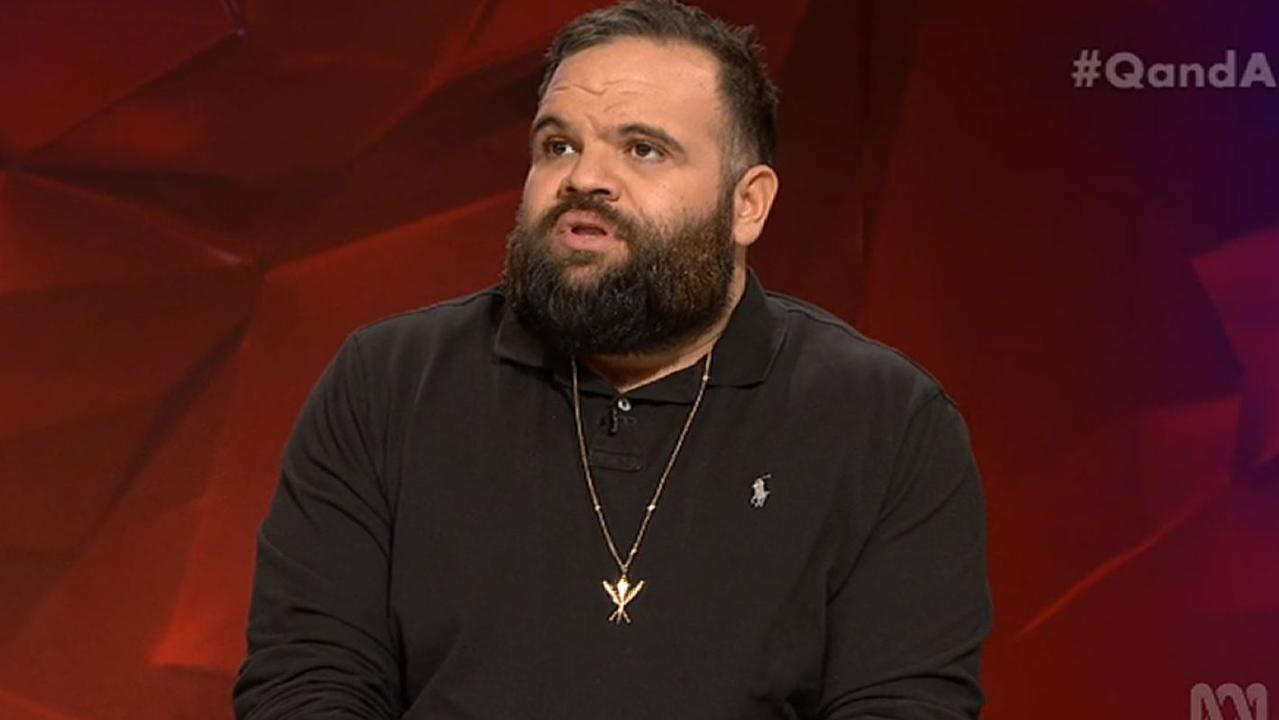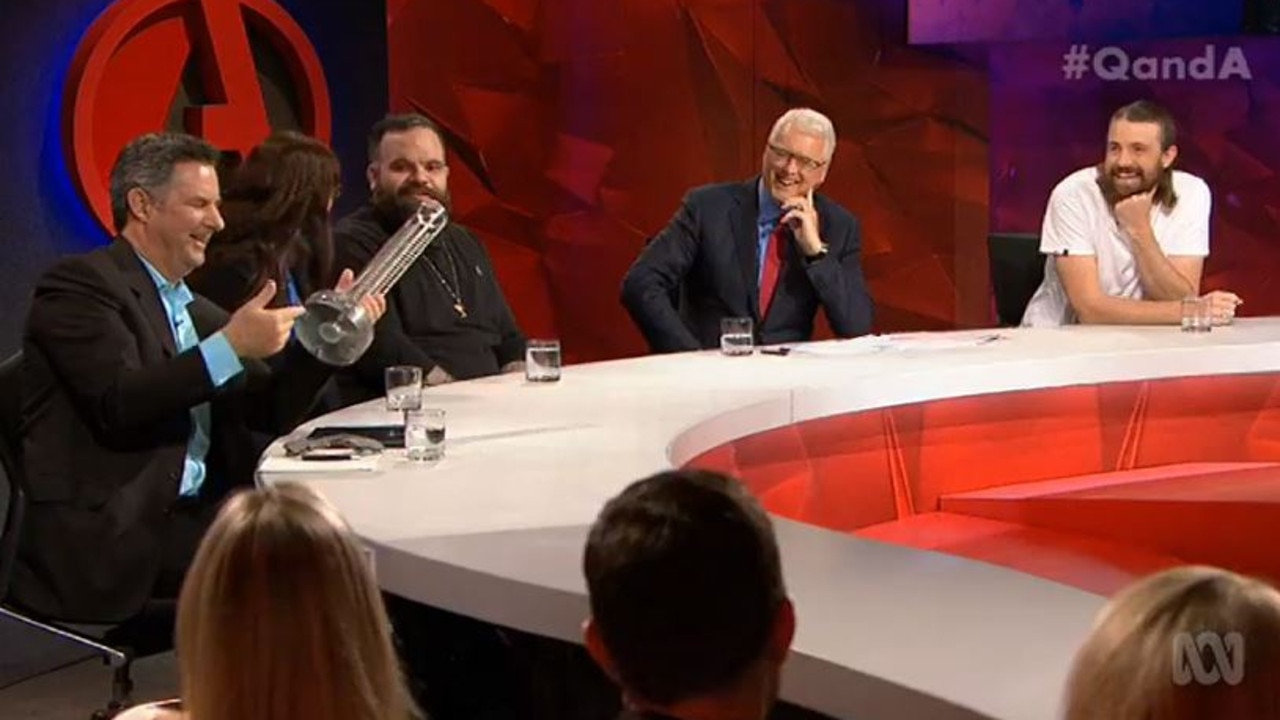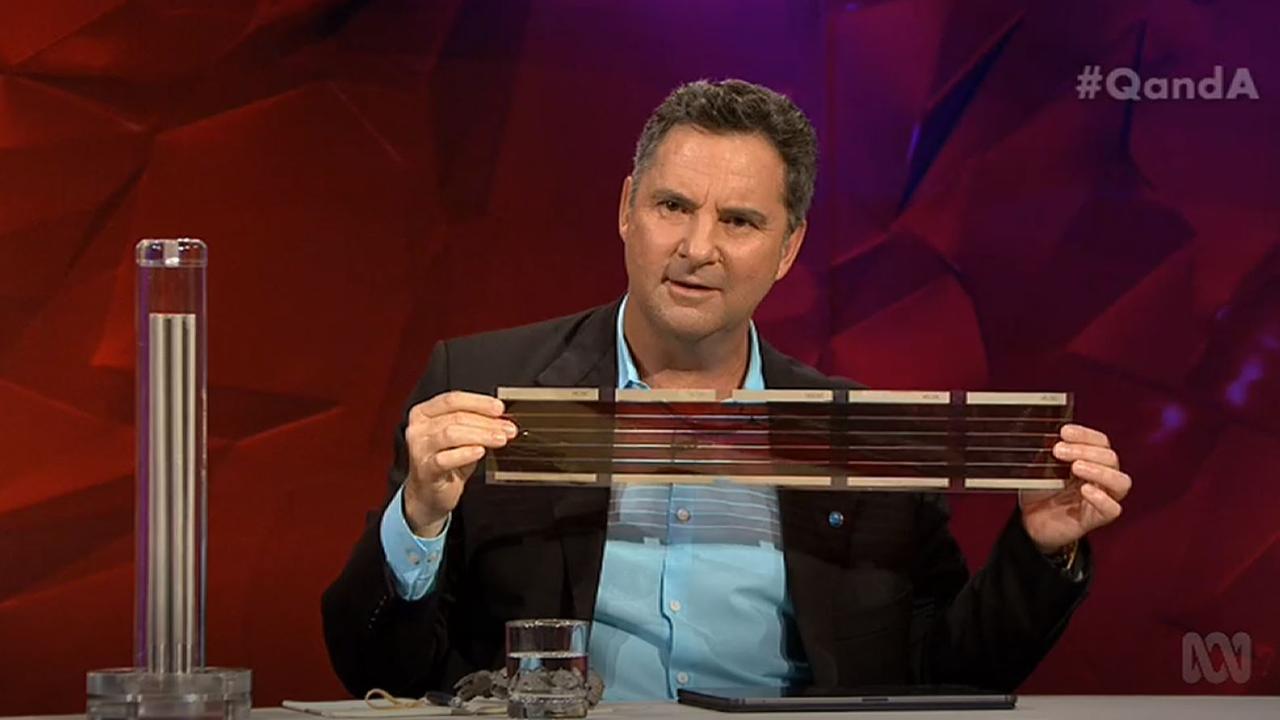Anthem debate and concerns about technology developments dominate Q&A
Indigenous rapper Briggs has revealed a shocking memory that highlights what the debate about Australia’s national anthem is all about.
Not everyone understands why some football players chose not to sing Advance Australia Fair at last week’s State of Origin rugby league game, but indigenous rapper Briggs has hit back at those who thought it was the wrong thing to do.
During ABC’s Q&A program Adam Briggs pointed out “change doesn’t come from being comfortable” and also shared a personal memory that appeared to shock some of the audience.
On Monday night’s show, Briggs was asked why Australians couldn’t seem to find a way to move forward together.
“I support possible changes to the flag and the national anthem, but not changing Australia Day,” one woman in the audience said. “However, I believe that we should be united in respecting the current flag and anthem for as long as they’re in place. Why can’t we ever seem to build on our common ground and move forward together?”
Briggs responded with a story about his childhood and the difficulty his parents had in buying a house as recently as the 1980s.
“My parents got turned away from home ownership,” he said. “They had the deposit, but as soon as the person who was selling the house found out that they were indigenous, that house was no longer for sale.
“That was the 80s. The disadvantage we face is still alive today. It is still here. It hasn’t left us. We still wear it.”
Earlier Briggs said he was proud of the decision of some rugby league players, both indigenous and non-indigenous, to remain silent during the playing of the national anthem.
“What they did was strong and it was staunch. But it was also very calm and telling of their responsibility to their communities as well.

“What they did was fantastic and it was something to be proud of.”
He noted the anthem had only been around for 35 years.
“I don’t think anyone is really that attached to it because the song’s not that good,” Briggs said to laughter.
“Get over it. We’ve been here for 60,000 years. We had better songs.”
When it was suggested he could write a new version, Briggs instead said “(Australian singer-songwriter) Paul Kelly could do it. He’s alright”.
CSIRO chief executive Dr Larry Marshall backed a possible change and noted that if the flag and anthem were not uniting Australians then “let’s change it”.
“It doesn’t make a lot of sense to call our country young,” he said. “We should be proud of the fact that we have the oldest continuous culture in the world.”
During a segment on The Weekly last week, Briggs explained why the anthem “sucks”.
He said he had got a lot of “kickback” from his comments but the message was important.
“Change doesn’t come from being comfortable,” he said. “I have to make myself uncomfortable and wear a lot of that stuff to be able to shift these ideas and move these things.
“I have to make myself uncomfortable to make everybody else uncomfortable so they start talking about it.”
WE NEED TO REPLACE $160 BILLION
Another area that needs change in Australia is the country’s reliance on coal and other resources exports to prop up the economy.
Dr Marshall of the CSIRO acknowledged the huge role that resources play in Australia’s economy, saying “if you add up coal, LNG and iron ore … it’s $160 billion of export revenue”.
“More importantly, it’s a third of all corporate tax paid in the country,” he said.
“We need something to replace it.
Dr Marshall said the CSIRO had been working on some projects and took the opportunity to spruik its plans for energy transition, complete with props.
Pulling out a long thin cylinder, Dr Marshall said one option was the “hydrogen cracker” which transforms liquid fuel such as ammonia into pure hydrogen, which produces no emissions and is a 100 per cent renewable fuel.

“We invested in this because we think it could go some of the way to replacing the fossil fuel exports,” he said.
Another potential innovation was for Australia to produce 3D printed solar cells rather than buying panels from overseas, and CSIRO has also invented a feed supplement for cattle to reduce flatulence and bring down carbon emissions from livestock.
Asked about clean coal technology, Dr Marshall said: “We have got a lot of coal. If you could use science to do the seemingly impossible and turn coal into something that did not emit greenhouse gases, we would do it.
“We have created a version of coal that has a 30 per cent less emissions than a gasoline engine. So that’s a great step but it’s not zero. Hydrogen we believe can go to zero.”

AUSTRALIA’S LAWS ‘A JOKE’
Earlier the panel was also asked about new assistance and access laws that could force technology firms to hand over information to the government.
Atlassian co-founder Mike Cannon-Brookes warned the legislation was globally “a little bit of a joke of a piece of legislation” and was making Australian companies less competitive against those overseas.
“It means any consumer around the world that’s looking at two pieces of technology, two apps and two choices, will be less likely to choose the Australian one because of the fear someone is looking at their data,” he said.
Mr Cannon-Brookes said a growing number of government departments were starting to request access to Atlassian’s information.
“That’s the problem when laws are passed and are overly broad,” he said.
“Laws with loose definitions are extremely dangerous.”
The Australian billionaire whose software company Atlassian is now valued about $US26.6 billion also warned that the country was falling behind when it came to innovation.
Mr Cannon-Brookes said Australia spent a bit less than 1.9 per cent of GDP on corporate research and development, which was less than the OECD average.
He said that economies that spent on research and development generated more jobs and were more able handle technology changes. “They’re more resilient to shocks,” he said.




